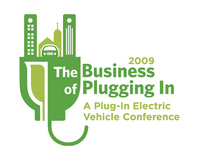In Joint Pledge, Utilities Ramp Up Efforts to Make Electricity a Crucial Transportation Fuel
SEE ALSO: EV-MOTORING.COM
DETROIT, Oct. 21, 2009; Declaring an urgent imperative to prepare for the use of electricity as a crucial transportation fuel in the future, the nation's electric utilities today collectively pledged to move forward aggressively to create the infrastructure to support the full-scale commercialization and deployment of plug-in electric vehicles (PEVs).
"Our industry acutely recognizes that now is the time to redouble our ongoing efforts to lay the groundwork for making plug-in electric transportation in this country a reality, not just a vision," said Anthony F. Earley, Jr., Chairman and CEO of DTE Energy and Chairman of the Edison Electric Institute. "We, as an industry, are eager to collaborate with the auto industry and others to bring PEVs to market."
EEI President Tom Kuhn added, "At a time of mounting concern about climate change, U.S. energy security and unemployment, plug-in electric vehicles will help tame carbon emissions while reducing oil imports and creating jobs. We also are mindful of President Obama's very ambitious challenge to put one million PEVs on the road by 2015."
Their comments, which came in conjunction with "The Business of Plugging In"--a conference here on the commercialization of PEVs sponsored by DTE Energy, General Motors, and the University of Michigan--launched the industry's commitment to help accelerate the penetration of PEVs in the United States. In addition to EEI's Kuhn, Earley was joined by Bill Ford, Executive Chairman of Ford Motor Co. and Michigan Gov. Jennifer Granholm. Ford underscored the automaker's commitment to PEV production, while Granholm outlined how Michigan would contribute to the goal.
"State governments in the Midwest are committed to collaborating with all partners to ensure we have the infrastructure and electrical capacity needed to support large-scale growth in plug-in electric vehicles," Granholm said. "The Midwestern Energy Infrastructure Accord, unveiled earlier this month at our Midwestern Governors Association Jobs and Energy Forum in Detroit, calls for expanding electric transmission capacity and adopting smart grid technologies."
The co-chairs of EEI's Electric Transportation Task Force, Ted Craver, Chairman and CEO of Rosemead, Calif.-based Edison International, and Bill Johnson, CEO of Raleigh, N.C.-based Progress Energy, led the development of the pledge, which was endorsed by EEI's Board of Directors in September.
"It's important that the customer experience with plug-in electric vehicles be a good one," said Craver. "As the market for plug-in vehicles develops and matures, electric utilities will need to work closely with state and local officials, public and private entities, automakers and other stakeholders to make sure the charging infrastructure is ready."
Besides testing "smart" charging systems that can provide load management or vehicle-to-grid applications, utilities also have started installing advanced metering infrastructure to support electric drive vehicles, focusing on charging technology, evolving rate design and managing electricity demand. Ultimately, the smart grid will become an invaluable partner in bringing PEV technology to the market, the executives said.
EEI members today also committed to develop and implement a customer service process that will be able to handle numerous PEV customer requests ranging from questions about charging stations to rate options and incentive plans.
"We will work to build on our experience with electric vehicles to help remove barriers to early customer adoption," said Johnson. "Early successes in using this exciting and complex technology will help encourage a transformation in the way we travel. Utilities are proud to work together on this important initiative."
Equally important, utilities will work closely with federal, state and local policymakers to support purchase and ownership incentives for vehicles and infrastructure alike. "Encouraging widespread adoption of electric transportation is an important piece of our strategy to reduce greenhouse gas emissions," Craver explained.
The utilities also pledged to continue the electrification of their own fleets as quickly as possible and collaborate with industry suppliers to develop sustainable fleet acquisition and operations plans.
"Our industry is already using neighborhood electric vehicles and will electrify the rest of our fleets as it makes sense," Johnson said. "We hope to drive the development and deployment of PEVs for medium- and heavy-duty utility applications, which will help us save money through reduced fuel costs and decrease our carbon emissions."
The utility industry's PEV pledge focuses on the following electric utility industry components of the commercialization of PEVs:
-- Infrastructure--Utilities will help ensure there are no system impacts
from fueling large numbers of plug-in vehicles from the power grid.
They also will help develop comprehensive local charging
infrastructure plans.
-- Customer Support--Utilities will ensure that PEV customers receive
excellent customer care on questions ranging from charging mechanics
to rates.
-- Customer and Stakeholder Education--Utilities will collaborate with
state and local officials, automakers and other stakeholders to
provide comprehensive education outreach to customers on all aspects
of PEVs.
-- Vehicle and Infrastructure Incentives--Utilities will work closely
with federal, state and local stakeholders to encourage PEV
penetration, including purchase incentives, tax rebates, off-peak
charging rates and subsidized parking.
-- Utility fleets--Utilities will take significant steps to accelerate
the introduction of PEVs into their utility fleet operations.
For a copy of the pledge, visit www.eei.org
The Edison Electric Institute (EEI) is the association of U.S. shareholder-owned electric companies. Our members serve 95 percent of the ultimate customers in the shareholder-owned segment of the industry, and represent approximately 70 percent of the U.S. electric power industry. We also have more than 65 International electric companies as Affiliate members, and more than 170 industry suppliers and related organizations as Associate members.
SEE ALSO: EV-MOTORING.COM



